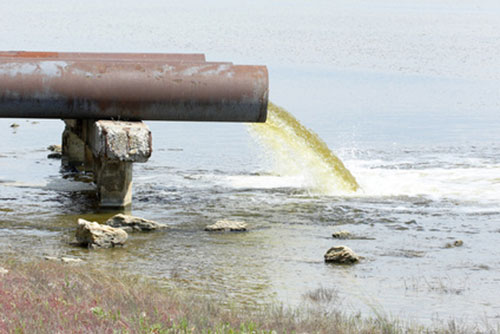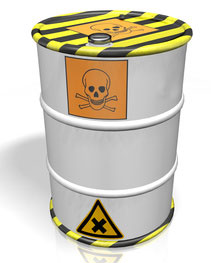If you are looking to invest in solar panels for environmental reasons, you’ll be pleased to know that, the solar electricity you will get from those panels will be 40 to 50 times less carbon intensive than electricity generated from coal.
But before you buy those solar panels and start basking in their green glow, you should be aware that the environmental impact of those panels might not be all good news.
Manufacturing solar panels is a pretty toxic business.
To make the most common crystalline-based solar panels the process goes something like this:
First silica has to be mined – usually in open cast pits.
Once the silica has been dug up it has to be refined, using one of the nastiest chemicals out there: hydrochloric acid, before it is cut into beermat sized wafers.
The wafers are then treated with another cocktail of industrial acids and heavy metals to turn them into the solar cells, that are soldered together (usually with a lead-based solder) to make up the familiar black/blue grid that you see behind the glass of a solar panel.
When operating these kinds of toxic manufacturing processes, how the factories handle worker protection, waste management and chemical storage is vitally important if they aren’t going to kill or maim both their workers and the local environment. Doing the right and safe thing tends to be very expensive.
It is clear that not all solar panel factories are making the investment needed to stay safe. In August 2011, there was an incident at a Solar panel factory in China which killed large numbers of fish in a nearby river and led to a 3 day protest by local villagers accusing the factory of dumping its toxic waste in their local environment. That solar company has since pledged to clean up its act – but the lack of firm regulations on pollution in places like China make it inevitable that many other factories we don’t know about are way below the standards we would accept in Australia.
Thankfully for green minded solar fans, there are a number of solar panel companies that do take their environmental obligations very seriously. But how do you find out who they are?
How to find an environmentally responsible solar manufacturer
That’s where the Silicon Valley Toxics Coalition (SVTC) may be able to help. Every year this US based not-for-profit group survey the major solar panel manufacturers on many aspects of their environmental responsibility including worker rights, health, and safety and chemical use. They compile the survey results into a solar scorecard. Encouragingly, for 2012, most of the surveyed companies responded. The ones that didn’t could only get scored based on the information on their corporate websites (and generally get much lower scores as a result!).
Here are the scores for the 2012 survey (higher is better):
Solar Panel Manufactuer | Score
| Trina | 94 |
| SunPower | 93 |
| SolarWorld | 91 |
| Yingli | 88 |
| REC | 87 |
| Suntech | 86 |
| Avancis | 79 |
| Sovello | 79 |
| Aleo Solar | 77 |
| Solon Energy GmbH | 75 |
| First Solar | 74 |
| Scheuten Solar | 66 |
| SoloPower | 61 |
| Motech | 56 |
| Panasonic* | 28 |
| ReneSola* | 11 |
| Sharp* | 9 |
| Canadian Solar* | 2 |
| HanWha Solar One* | 2 |
| Schott* | 2 |
| Jinko* | 0 |
| LDK* | 0 |
*Didn’t respond to SVTC’s survey
So if you are looking to buy solar panels and the environmental impact of those panels is important to you, then use these scores as your guide to maximize the chance that your solar panels really are environmentally friendly.
Finally – it’s interesting to see that all the top performers in the list above sell panels at a ‘reasonable’ price (i.e. not insanely cheap) and some of the ones at the bottom sell incredibly cheap panels. Like I said earlier – environmental protection for solar panel factories is not cheap – so please bear that in mind next time you are offered a phenomenally cheap solar system. By not paying a fair price for your solar panels, it may be poor Chinese villagers that are paying the price for your cheap panels through polluted rivers, dead fish and increased cancer rates through exposure to toxic industrial chemicals.



 RSS - Posts
RSS - Posts



I was wondering if you had any comments about JFY Inverters and Panels as well as Solar River Inverters.
I have 2 quotes that are the same, I believe the Solar River is a slightly better quality Inverter to the JFY, but i have found very little information about JFY to know if they are fairly rubbish. I am tempted to buy Solar from either Ultra Green Sun Solar or Energy Bank. I just don’t know if JFY Inverters will break before the 5 years is up. (warranty is the same for both brands 5 years).
I have read your article on what i believe is Solar River, (but named differently) but i am unsure if they are any better than the JFY.
Thanks for your time.
Best Regards
Tom
Solar Rivers are made by Samil Power – which get great reviews and have a good reputation in the industry.
You should be able to increase the inverter warranty to 10 years – even if it costs a few dollars to extend it – even good inverters are the most likely component to fail in the first 10 years. Make it a showstopper and you should get the extra warranty!